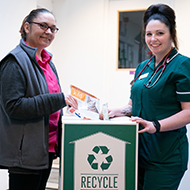
Pennard Vets aims to prevent uncontaminated clinical clothing and equipment ending up in landfill.
Kent-based veterinary group Pennard Vets has launched an innovative scheme to ensure surgical aprons, masks and plastic syringes are recycled rather than sent to landfill or incinerated.
The scheme, which also recycles blister packs and needles, is being trialled at the Group’s Tonbridge and Sevenoaks practices, with plans to roll it out across the entire Group in the future.
It forms part of a series of initiatives being implemented by the Pennard Vets to reduce the Company's carbon footprint, including installing energy-efficient LED lighting with motion sensors and replacing plastic bags with paper or tote bags.
The employee-owned Group has also joined forces with Hills Pet Nutrition to recycle the brand’s foil pet food pouches through the national TerraCycle programme. It means that cat and dog clients of the Group’s Sevenoaks, Tonbridge and Maidstone surgeries can now take their empty packaging into their practice for recycling.
Beth Kirwan, head veterinary nurse at Pennard Vets’ Sevenoaks practice, said: “Historically the veterinary industry has produced more than its fair share of waste, and at Pennard Vets we’re working hard to reduce our impact on the environment. This has been accelerated by us becoming employee-owned, which means our entire team are now even more empowered to put forward ideas and drive change through the business.
“We already have weekly collections of cardboard, tins, drip bags and tubing, but we wanted to do more to reduce the amount of waste going to landfill or being incinerated."
She added: “Pet food packaging uses special materials, to keep food fresh for extended periods and prevent leaks, which means it can’t be recycled in domestic bins. Previously we were taking Hill’s food pouches to specialist recycling points, but introducing our own collection bins is dramatically increasing the amount of waste we can recycle, and it’s already proving popular with local pet owners.
“We’re also excited to now be in a position to start recycling clinical clothing and equipment, that don’t contain blood, medicines or biological contaminants, which gives us a big opportunity to significantly reduce our environmental impact further. Hopefully the industry will see that changes likes these at individual practices will all combine to make a big difference.”
Image (C) Pennard Vets.



 The RCVS has announced a new version of its 1CPD mobile app, with enhanced features for veterinary surgeons and veterinary nurses to record their continuing professional development.
The RCVS has announced a new version of its 1CPD mobile app, with enhanced features for veterinary surgeons and veterinary nurses to record their continuing professional development.